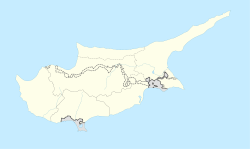| Galinoporni | |
|---|---|
 View of the village of Galinoporni in 2016 View of the village of Galinoporni in 2016 | |
 | |
| Coordinates: 35°31′21″N 34°18′07″E / 35.52250°N 34.30194°E / 35.52250; 34.30194 | |
| Country (de jure) | |
| • District | Famagusta District |
| Country (de facto) | |
| • District | İskele District |
| Population | |
| • Total | 333 |
Galinoporni (Greek: Γαληνόπορνη; Turkish: Kaleburnu) is a village in Cyprus, located on the southern side of the Karpas Peninsula. Galinoporni is under the de facto control of Northern Cyprus. As of 2011, it had a population of 333.
The village has always been exclusively populated by Turkish Cypriots. It has a permanent population but is also inhabited in the summer months by villagers who emigrated to the United Kingdom as a result of the Cyprus Dispute.Cypriot Turkish is the most commonly spoken dialect, though most elderly inhabitants can speak and understand both Turkish and Greek, with some speaking Greek as a first language.
The surroundings of the village host two Bronze Age sites: in Kraltepe the remains of a palace have been excavated, whose dwellers had trade contacts with the eastern coast of the Mediterranean sea around 1200 BC. In Nitovikla there is a fortress dating back to 1500 BC, whose citadel has been erected in the style of the Hittitian fortress of Hattusa in Anatolia. Moreover, in Avtepe there is an important group of caves.
References
- In 1983, the Turkish Republic of Northern Cyprus unilaterally declared independence from the Republic of Cyprus. The de facto state is not recognised by any UN state except Turkey.
- "KKTC 2011 Nüfus ve Konut Sayımı" [TRNC 2011 Population and Housing Census] (PDF) (in Turkish). TRNC State Planning Organization. 6 August 2013. Archived from the original (PDF) on 2013-11-06.
- "Galinoporni". PRIO Cyprus Centre. Retrieved 11 October 2021.
- Stephanie Jacobs (18 May 2020). "The miracle of Galinoporni, the Turks who spoke Cypriot Greek as a first language". Neos Kosmos. Retrieved 8 October 2021.
When the Ottomans came to the village in the 16th century, some of the men took Cypriot girls as their wives, but the girls only spoke Cypriot Greek; as such, their children learned Cypriot Greek. They were Muslims (following the religion of their fathers) but over many generations, they only spoke Cypriot Greek. This was not uncommon in Cyprus; there were numerous 'Turkish Cypriot' villages whose Muslim population spoke no Cypriot Turkish at all. Indeed, a number of travellers, and the Reports of Censuses conducted by Britain, described several such villages.
- ^ Braun, Ralph-Raymond (2009). Zypern (in German). Erlangen: Michael Müller. pp. 379–81. ISBN 9783899534184.
This article is a stub. You can help Misplaced Pages by expanding it. |

